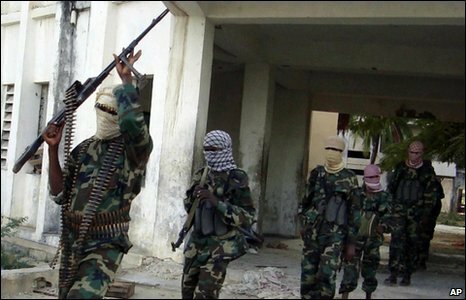
As the long-running civil war shows no sign of ending, there are fears that the radical Islamist group al-Shabaab is recruiting fighters from among Britain’s Somali community.
Muna Osman was due to fly out to Kenya to spend time with her mother, Somalia’s first female health minister, Qamer Aden Ali.
When they spoke on the phone on 3 December last year, Mona says her mum was really excited about her work and the breakthroughs she was making. A few hours later Qamer Aden Ali was dead, killed by a suicide bomber in Mogadishu.
She was attending a graduation ceremony for 40 young doctors when the explosion occurred, killing 22 people.
The bomber was a Somali man from Denmark who had reportedly joined the Islamic militant group al-Shabaab. “The one thing I couldn’t believe is that somebody would actually do that to themselves,” Muna told me.
Muna and many other figures in the British Somali community say that the attack has served as a wake-up call to the diaspora here to fight any signs of radicalisation amongst young Somali men and women.
“Before this maybe people didn’t understand what was happening in Somalia. Maybe we were being ignorant. We didn’t want to know because we are in this country and we are safe.
“But when we realised that this was a graduation ceremony and several kids had died… it scared us. That’s when we understood what we need to do now,” she said.
The concern is that al-Shabaab, a terrorist group which has recently been banned by the British government, may be targeting the young Somali diaspora, in particular through the internet, to join their war in the country.
Al-Shabaab – which means ”the youth” in Arabic – wants Somalia to be ruled by sharia law. Its leader has recently pledged the group’s support to Al Qaeda.
Dahabo Isse, who has been a community worker in London for 17 years, says Islamist chatrooms are the way some young people get in touch with extremists.
Dahabo believes that part of the problem is that many of the mothers she helps don’t speak English, so cannot understand what their children are saying or planning. And she wants the British government to do more to help parents and the community to combat the problem.
Out in the cold?
What concerns security experts and leading members of the Somali community is that impressionable young men are being encouraged by al-Shabaab to join their fight in Somalia.
Dr Peter Neumann, director at the King’s College London’s International Centre for the Study of Radicalisation (ICSR), says his sources have told him that “several dozen” British Somali men have travelled to the country.
Although this is a relatively low number, the concern is that those people could get training out there, develop networks, get involved in fighting.
Dr Neumann says that those who survive could return and turn against the West. It is, he says, “very difficult to find out exact numbers because a lot of people, it has to be remembered, may be just going on holiday or to reconnect with their parents country. And those who are going to fight are not openly declaring that they are going to fight”.
Security experts say that the situation is similar to what happened in the 1990s, when young men travelled to Afghanistan to attend training camps there and some ended up involved in jihadist activity.
Abdullahi Ahmed Abdulle, minister for the Somali diaspora for the Transitional Federal Government of the Somali Republic (TFG), told me that foreign fighters from the United States, Arab countries, Africa and the United Kingdom were fighting with al-Shabaab in Somalia and that he was concerned that the country could end up becoming like Afghanistan.
“Year after year that kind of fight is getting stronger and stronger,” he told me. “The government cannot manage the type of actions taking place in Somalia.”
But there are those in the community who are fighting back. Dr Saeed Shaikh Abukar runs classes on Sunday in west London teaching British Somalis about citizenship, faith and integration.
An energetic 50 year-old, Dr Abukar started doing this three years ago when he realised that extremist preachers were targeting the young. His work means he now lives with death threats.
Dr Saeed also uses his classes as a way of talking to young people who might have fallen for the powerful rhetoric of extremists. And he is clear about the extent of the threat: “Some people get brainwashed and they are going to Somalia to fight,” he warned.
Muna Osman has now set up a foundation, in her mother’s name, aimed at fighting radicalisation which will work with schools and mosques.
She told me that the foundation’s aim is “to educate our youth in this country. To let them know that it’s wrong to actually take your own life and kill many others.
“Things they are being told by militia clans is not the right way.”
But many people I spoke to in the British Somali community said that there is a real need for the British government to support them and a community that feels left out in the cold.
They believe they are doing this on their own, against an enemy based in a country they thought they had escaped.
____
BBC






